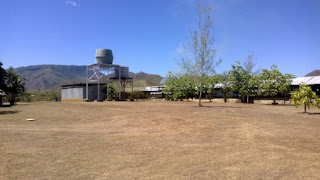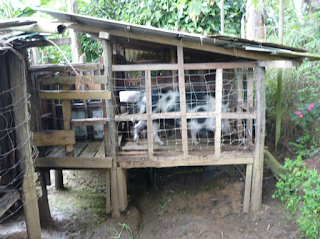6. The trial site: Farm Alstonia
Our field research had indicated strongly that a village-based pig production business supplying a small regional abattoir and processing facility could develop in response to demand from the growing Hela provincial economy.
The preferred plan was to invest in a
sow farm that would produce the young pigs which the villagers would feed and
grow to market in small village pig houses. We thought that we could manage the sow farm and ensure that there were
always enough pigs in the system to supply the villagers. If we could not raise
the capital for the sow farm, then we would develop a system where the
villagers, individually or with pooled resources, could each own 10 sows and produce
the young pigs. This was higher risk,
and less efficient in terms of scale, but could still work. The alternative was
to find a partner willing to produce the young pigs. It really depended on how much capital could
be found.
Before could get to this stage we had
to show that we could successfully grow pigs on a kau kau silage diet. Even
then we had a difficult road ahead. There was no meat processing, storage,
wholesale or retail cold chain infrastructure at all in Hela province. There was
no formal market nor trading mechanism.
Everything; the sow farm, village pig houses, the abattoirs, the boning
room and meat processing facility, butchers shop, delivery network, farmer
training and customers had to be built from scratch. The breeding stock had to
be imported from Port Moresby and we had to staff the business, the abattoir,
processing facility, the butcher shops and the cash vans that would extend the
retail network.
We thought the best
way to start was with a six-month trial to demonstrate that we could at least
produce pigs successfully by feeding kau kau silage supplemented with a protein mineral premix. Accordingly, we sought to build or lease a
pilot facility. First get the pigs, feed
them the diet, see if they grow and then set about processing some cuts of meat
and test the market to prove the viability of the value chain. Oil Search Limited agreed with this approach
and agreed to fund the project.
After a protracted
negotiation we were able to satisfactorily conclude a leasing agreement with
Rimbink Pato to demonstrate the proof of concept on his Farm Alstonia at 17
Mile, Sogeri Rd, Port Moresby.
 |
| Farm Alstonia showing the main shed and water tank, in the dry season |
 |
| The arboretum at Farm Alstonia, wet season |
The most appealing aspect of the farm was an arboretum about 0.25 ha planted to a variety of fully grown young tropical trees. It provided a beautiful backdrop to the farm mess and office area.
We needed the place
bare to start with. I didn’t want the risk of any of the original pigs
spreading disease to the trial pigs. If
the trial worked we thought we could select breeding stock from them, grow them
out and mate them.
The source herd for the trial pigs was a nearby high health status
herd so we should be able to retain that.
All we needed was a thorough clean of the pens and spelling them for
some months in the Port Moresby heat. We needed about three people to manage
the trial but on the day that we arrived for our inspection, Liam, John and I were confronted with 12 staff members all worried about their
jobs. It didn’t need to be pointed out
that an aid NGO and a large oil company firing most of the farm work force at
the beginning of a major developmental aid project was a bad look.
In the next blog we prepare the Farm Alstonia site for the trial and the pigs arrive
In the next blog we prepare the Farm Alstonia site for the trial and the pigs arrive



Comments
Post a Comment